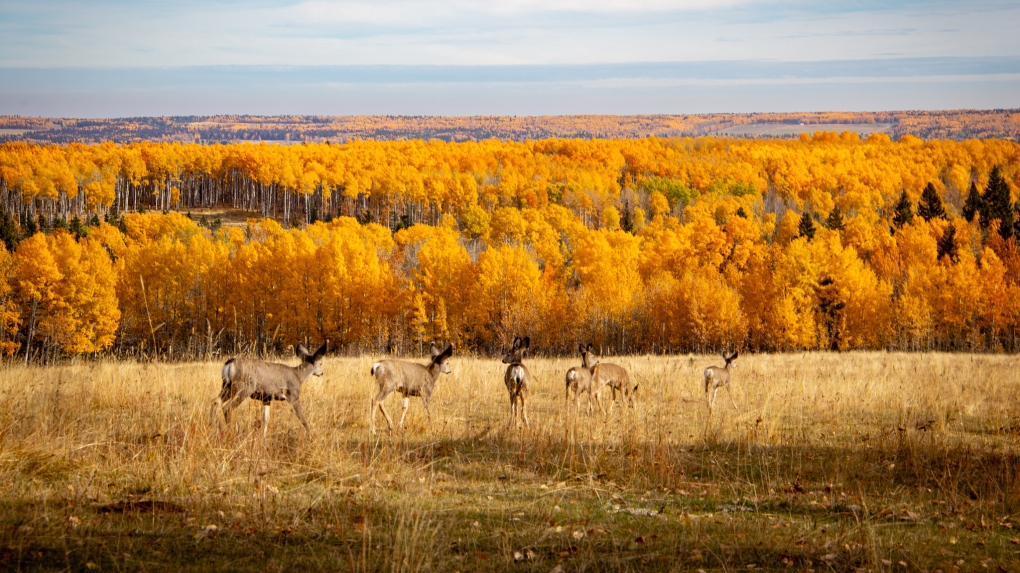7 orphaned deer fawns run wild again after successful rehabilitation
 Seven orphaned deer fawns were released back into the wild near Sundre, Alta., on Oct. 16, 2024. (Courtesy: Alberta Institute for Wildlife Conservation)
Seven orphaned deer fawns were released back into the wild near Sundre, Alta., on Oct. 16, 2024. (Courtesy: Alberta Institute for Wildlife Conservation)
After spending months caring for seven deer fawns, The Alberta Institute for Wildlife Conservation (AIWC) celebrated their release into the wild this week.
The mule and white-tailed deer arrived at AIWC’s rehabilitation centre five months ago.
Scottie Porter, AIWC’s communications coordinator, says some were orphaned, others injured and at least one was kidnapped.
AIWC says it's common for mother deer to leave their babies alone for much of the day to avoid attracting predators, and well-intentioned people mistakenly rescue a healthy fawn believing it to be orphaned.
Porter points out young deer are the most demanding patients AIWC treats. When the fawns first arrived, they required formula feedings six times a day.
“It can be quite chaotic in the deer paddock, as the fawns push and shove to be the first to get formula," says Porter.
When they moved to a primarily leaf-based diet, staff and volunteers had to collect up to 180 kilograms of fresh twigs and vegetation every day.
“Staff drive around the countryside to find and cut down suitable leaves and branches from aspen and poplar trees … it's one of the most labour-intensive tasks for our clinic team from late summer to early fall,” says Porter.
But all that work paid off. On Wednesday, the young deer were placed in individual boxes and driven to a forested area west of Sundre. When the doors were opened, the deer casually walked out and ventured off into the woods.
 Seven orphaned deer fawns were released back into the wild near Sundre, Alta., on Oct. 16, 2024. (Courtesy: Alberta Institute for Wildlife Conservation)
Seven orphaned deer fawns were released back into the wild near Sundre, Alta., on Oct. 16, 2024. (Courtesy: Alberta Institute for Wildlife Conservation)
AIWC is a non-profit organization and “rehabilitation of a single fawn costs over $1300,” says Porter.
“The public can help AIWC prepare for next spring’s fawn season by making a donation at www.aiwc.ca.”
CTVNews.ca Top Stories

BREAKING Real GDP per capita declines for 6th consecutive quarter, household savings rise
Statistics Canada says the economy grew at an annualized pace of one per cent during the third quarter, in line with economists' expectations.
W5 Investigates A 'ticking time bomb': Inside Syria's toughest prison holding accused high-ranking ISIS members
In the last of a three-part investigation, W5's Avery Haines was given rare access to a Syrian prison, where thousands of accused high-ranking ISIS members are being held.
Class-action lawsuit on 'opioid-related wrongs': Court to rule on drug companies' appeal
Canada's top court will rule Friday on the appeal of a class-action lawsuit meant to recoup some of the costs associated with British Columbia's opioid crisis from major drug makers and distributors.
As Australia bans social media for children, Quebec is paying close attention
As Australia moves to ban social media for children under 16, Quebec is debating whether to follow suit.
Irregular sleep patterns may raise risk of heart attack and stroke, study suggests
Sleeping and waking up at different times is associated with an increased risk of heart attack and stroke, even for people who get the recommended amount of sleep, according to new research.
California man who went missing for 25 years found after sister sees his picture in the news
It’s a Thanksgiving miracle for one California family after a man who went missing in 1999 was found 25 years later when his sister saw a photo of him in an online article, authorities said.
Trudeau Liberals' two-month GST holiday bill passes the House, off to the Senate
The federal government's five-page piece of legislation to enact Prime Minister Justin Trudeau's promised two-month tax break on a range of consumer goods over the holidays passed in the House of Commons late Thursday.
Nick Cannon says he's seeking help for narcissistic personality disorder
Nick Cannon has spoken out about his recent diagnosis of narcissistic personality disorder, saying 'I need help.'
Notre Dame Cathedral: Sneak peek ahead of the reopening
After more than five years of frenetic reconstruction work, Notre Dame Cathedral showed its new self to the world Friday, with rebuilt soaring ceilings and creamy good-as-new stonework erasing somber memories of its devastating fire in 2019.
































